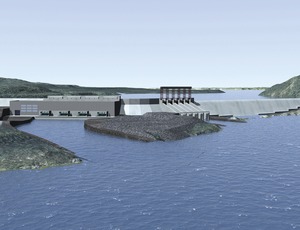
Rolling blackouts and power outages throughout Canada's Newfoundland and Labrador province in January have prompted the Board of Commissioners of Public Utilities (PUB) to launch a probe into Nalcor Energy and its management of power generation and transmission infrastructure.
PUB's announcement of the investigation comes after a number of public complaints claimed that utility corporations Nalcor and Newfoundland and Labrador Hydro had focused all their development efforts on the approximately $7.8-billion Muskrat Falls hydropower project, now under construction, while neglecting crucial, existing infrastructure.
In late December, Hydro realized many of its power-generating assets were not in the position to meet peak demand when plunging temperatures from the polar vortex caused an unusual spike. Hydro then publicly notified the utilities board that it planned to institute a period of rolling blackouts, which started on Jan. 2. Next, a transformer fire and a separate breaker malfunction threw the Holyrood generating station off line and led to unplanned outages.
Nalcor is the parent company of Newfoundland and Labrador Hydro, but the companies have separate management teams and budgets, says Karen O'Neill, spokeswoman for Nalcor. This is significant, she says, because Muskrat Falls is managed and financed through Nalcor and would not have affected Hydro's financial ability to upgrade and maintain its own infrastructure.
Critics say, however, necessary improvements were neglected. "The feeling is that they have taken their eye off the ball," said Dennis Browne, a St. John's, Newfoundland, lawyer and member of the 2041 Group, opponents of Muskrat Falls. "Newfoundland's power peak is usually in February, but Hydro should have been ready for that. The utility could have brought in a third transmission line to the island from the Bay d'Espoir generating station. That would have given us another 175 MW of capacity but also shown that Muskrat Falls is unnecessary. That's why they didn't build it."
Kathleen Dunderdale, premier of Newfoundland and Labrador, said the blackouts were caused by generation, not transmission, issues and illustrated the province's need for Muskrat Falls' planned 550 MW of electricity.
But Muskrat is not being built for the province's own demand—it is part of Nalcor's ambition to sell electricity to external markets, Browne says.
"When the 5,428-MW Labrador Upper Churchill generating station was completed in the 1960's, Brinco, a private company, entered into a 65-year contract to sell Quebec electricity for a half-cent per kilowatt with no inflationary escalation clause," Browne says. "Nalco, inherited that contract, which has been a topic of several lawsuits. It's in effect until 2041, and Quebec is reselling that electricity and making billions."
That's why, Browne says, Dunderdale and Nalcor are so focused on building Muskrat Falls. "They think it allows them to sell electricity without going through Quebec."



Post a comment to this article
Report Abusive Comment